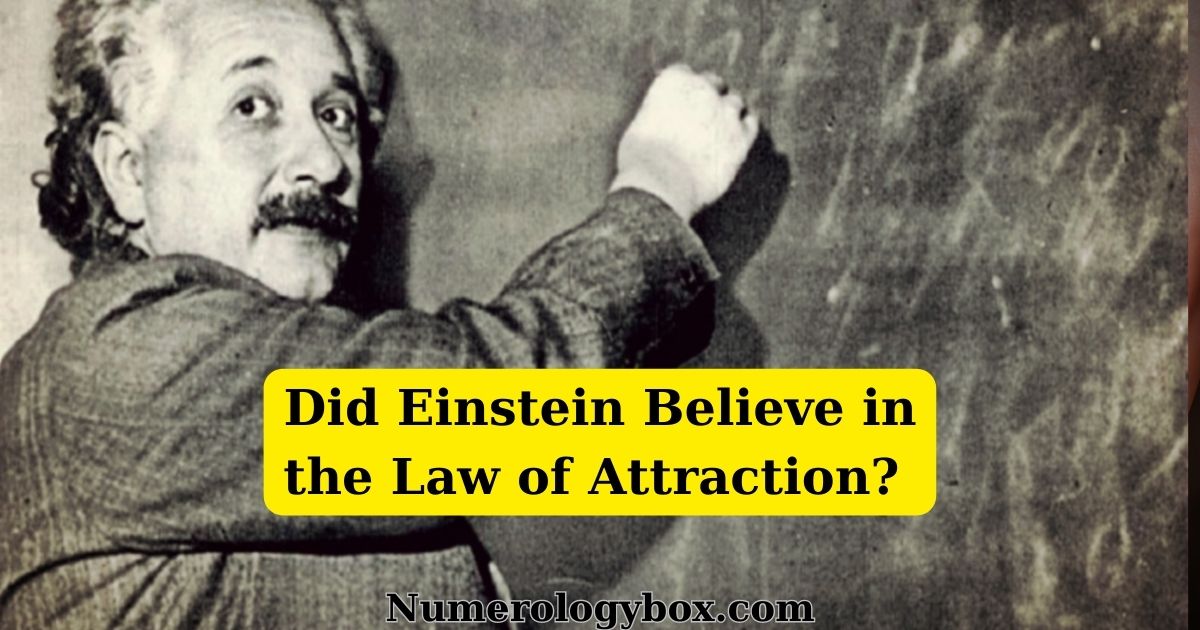Did Einstein Believe in the Law of Attraction? The Truth Revealed
The Law of Attraction has been a hot topic for decades, and many people believe in its power to manifest their desires. However, there has been a lot of speculation about whether famous scientist Albert Einstein believed in this law or not. In this blog, we will explore the truth behind this controversy and answer the question, “Did Einstein believe in the Law of Attraction?”

what is the Law of Attraction?
First, we need to understand what the Law of Attraction is. It is a theory that states that people can attract positive or negative experiences and outcomes based on their thoughts and emotions. This law is based on the idea that everything is made up of energy, including our thoughts and emotions. Therefore, if we focus our thoughts and emotions on positive outcomes, we can attract them into our lives.
Now, let’s look at whether Einstein believed in this law or not. While there is no direct evidence that Einstein spoke about the Law of Attraction, there are some indirect references that suggest he may have believed in it. For example, Einstein was known for his belief in the power of imagination. He once said, “Imagination is more important than knowledge. For knowledge is limited, whereas imagination embraces the entire world, stimulating progress, giving birth to evolution.”
This quote suggests that Einstein believed in the power of our thoughts and imagination to shape our reality. This idea is consistent with the Law of Attraction, which also emphasizes the power of our thoughts and emotions to attract what we want in life.
Another indirect reference to Einstein’s belief in the Law of Attraction is a letter he wrote to his daughter in 1932. In the letter, he wrote, “I am convinced that He (God) does not play dice.” This statement suggests that Einstein believed in the power of intention and that there is some order to the universe that we can tap into. This idea is also consistent with the Law of Attraction.
Albert Einstein’s Belief In The Law Of Attraction
Albert Einstein is known as one of the greatest scientists of all time, with his contributions to the field of physics being revolutionary and inspiring. However, there has been a lot of speculation about his beliefs in the Law of Attraction, a theory that states that people can attract positive or negative experiences and outcomes based on their thoughts and emotions.
There is no direct evidence that Einstein believed in the Law of Attraction, but there are some indirect references that suggest he may have believed in it. For instance, Einstein was known for his belief in the power of imagination. He believed that imagination was more important than knowledge, and that it had the ability to stimulate progress and give birth to evolution.
This idea is consistent with the Law of Attraction, which emphasizes the power of our thoughts and emotions to manifest our desires. By focusing our thoughts and emotions on positive outcomes, we can attract them into our lives.
Moreover, in a letter written to his daughter in 1932, Einstein wrote, “I am convinced that He (God) does not play dice.” This statement suggests that Einstein believed in the power of intention and that there is some order to the universe that we can tap into. This idea is also consistent with the Law of Attraction.
However, it is important to note that Einstein was a scientist and believed in the power of evidence-based research. It is unlikely that he would have blindly accepted the Law of Attraction without empirical evidence to support it.
While there is no concrete evidence that Albert Einstein believed in the Law of Attraction, there are some indirect references that suggest he may have been open to the idea. His belief in the power of imagination and intention is consistent with the principles of the Law of Attraction. Nonetheless, his scientific nature would have demanded empirical evidence before accepting the theory as fact.
The Power Of Positive Thinking
Positive thinking is a mental and emotional attitude that focuses on the good and positive aspects of life. It is the practice of looking for the positive in situations and choosing to focus on the good rather than the bad. Positive thinking can have a profound impact on our mental and emotional well-being, as well as on our physical health.
There is a growing body of research that suggests that positive thinking can have a range of benefits, including:
Improved mental health:
Positive thinking has been shown to reduce symptoms of depression and anxiety, and to improve overall mental well-being.
Increased resilience:
People who think positively are more resilient in the face of adversity, and are better able to bounce back from setbacks.
Better physical health:
Positive thinking has been linked to a range of physical health benefits, including a stronger immune system, lower blood pressure, and a reduced risk of heart disease.
Improved relationships:
People who think positively tend to have better relationships with others, as they are more optimistic, empathetic, and compassionate.
How can we cultivate a positive thinking mindset?
Here are some strategies:
Practice gratitude:
Take time each day to reflect on the good things in your life, and express gratitude for them.
Reframe negative thoughts:
When negative thoughts arise, try to reframe them in a more positive light.
Surround yourself with positivity:
Spend time with people who uplift and inspire you, and engage in activities that bring you joy.
Visualize success:
Visualize yourself achieving your goals and experiencing success, and focus on the positive feelings that come with that.
Positive thinking can have a powerful impact on our mental, emotional, and physical well-being. By cultivating a positive mindset, we can improve our overall quality of life, build resilience, and achieve greater success and fulfillment.
Einstein’s Theory Of Relativity
Albert Einstein’s Theory of Relativity is one of the most significant scientific achievements of the 20th century. It completely revolutionized our understanding of the universe, space, and time. The theory comprises of two main parts – the Special Theory of Relativity and the General Theory of Relativity.
The Special Theory of Relativity, published by Einstein in 1905, proposed that the laws of physics are the same for all observers in uniform motion relative to each other, regardless of their relative velocities. In other words, there is no absolute frame of reference in the universe. This theory also introduced the famous equation E=mc², which shows the equivalence between mass and energy.
The General Theory of Relativity, published in 1915, builds upon the Special Theory of Relativity by proposing that gravity is not a force between masses, as previously believed, but rather a curvature of spacetime caused by the presence of mass and energy. This theory also predicts the existence of black holes, gravitational waves, and the bending of light in the presence of massive objects.
The implications of Einstein’s Theory of Relativity are far-reaching and have had a significant impact on both scientific and philosophical thought. The theory has been confirmed through numerous experiments, and its predictions have been observed in astronomical observations and technological advancements.
One of the most important practical applications of the theory is the Global Positioning System (GPS). GPS relies on the precise measurement of time and the ability to correct for the effects of relativity on signals traveling from satellites in orbit to receivers on the ground.
Einstein’s Theory of Relativity has revolutionized our understanding of the universe and laid the foundation for much of modern physics. The theory continues to inspire scientists to this day, and its impact can be seen in numerous technological advancements that we use in our daily lives.
Einstein’s Views On The Universe
Albert Einstein’s views on the universe were shaped by his groundbreaking work in physics, including his Theory of Relativity. Einstein’s work challenged traditional ideas about space, time, and the nature of the universe, and he had a significant impact on our understanding of these concepts.
One of Einstein’s key ideas was that the universe is a single, unified entity. He believed that everything in the universe is connected and that there are no separate, isolated parts. He also believed that the laws of physics are the same throughout the universe, regardless of location or time.
Another important concept in Einstein’s views on the universe was the idea of spacetime. He proposed that space and time are not separate entities but are interconnected, forming a four-dimensional fabric known as spacetime. This idea was central to his Theory of Relativity, which proposed that gravity is the result of the curvature of spacetime caused by the presence of mass and energy.
Einstein also believed that the universe is expanding, a view that was later confirmed by observations of distant galaxies. He initially introduced the idea of a cosmological constant to counteract the effects of this expansion, but later retracted this idea after it was shown that the universe was indeed expanding.
Finally, Einstein believed that the universe was fundamentally deterministic, meaning that everything that happens is the result of preceding events and that everything that will happen in the future is predetermined by past events. This view was challenged by the development of quantum mechanics, which introduced the concept of randomness and uncertainty into physics.
In summary, Einstein’s views on the universe were shaped by his groundbreaking work in physics, including his Theory of Relativity. He believed in a unified, interconnected universe governed by the same laws of physics everywhere, and proposed important concepts such as spacetime and the curvature of space caused by mass and energy. His views continue to influence scientific and philosophical thought today.
FAQS
What is Albert Einstein famous for?
Albert Einstein is most famous for his groundbreaking work in physics, including his Theory of Relativity, which completely revolutionized our understanding of the universe and space-time. He is also known for his famous equation E=mc², which shows the equivalence between mass and energy.
What is Einstein’s Theory of Relativity?
Einstein’s Theory of Relativity is a set of two theories: the Special Theory of Relativity, published in 1905, and the General Theory of Relativity, published in 1915. The theories propose that the laws of physics are the same for all observers in uniform motion relative to each other and that gravity is the result of the curvature of spacetime caused by the presence of mass and energy.
What did Einstein mean by “God does not play dice”?
Einstein used this phrase to express his belief that the universe is fundamentally deterministic and that everything that happens is the result of preceding events. He was critical of the probabilistic nature of quantum mechanics, which introduced the concept of randomness and uncertainty into physics.
Did Einstein believe in God?
Einstein’s religious beliefs were complex and often a subject of debate. He was raised in a Jewish family but rejected the idea of a personal God. He believed in Spinoza’s God, which was the idea that the universe itself was divine and that God was present in the laws of nature.
Did Einstein believe in the afterlife?
Einstein was skeptical of the idea of an afterlife and believed that death was simply the cessation of biological processes. He once wrote, “I believe that the abominable deterioration of ethical standards stems primarily from the mechanization and depersonalization of our lives, a disastrous byproduct of science and technology.”
Relation:
Should I listen to my dreams?
Is there a day that nobody was born on?
Does law of attraction exist?
What to read next:
Source: https://numerologybox.com
Category: Angel Number




